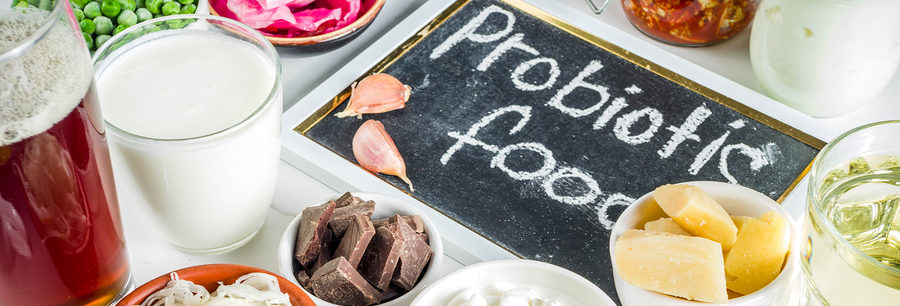What Are Probiotics?
The root of the word probiotic comes from the Greek word “pro”, meaning “promoting”, and biotic, meaning “life”. The discovery of probiotics came about in the early 20th century, when Elie Metchnikoff, known as the “father of probiotics,” had observed that rural dwellers in Bulgaria lived to very old ages despite extreme poverty and harsh climate.
He theorized that health could be enhanced and senility delayed by manipulating the intestinal microbiome with host-friendly bacteria found in sour milk. Since then, research has continued to support his findings along with suggesting even more benefits.
Probiotics are live microorganisms that are intended to have health benefits when consumed or applied to the body. They can be found in yogurt and other fermented foods, dietary supplements.
Although people often think of bacteria and other microorganisms as harmful “germs,” many are actually helpful. Some bacteria help digest food, destroy disease-causing cells, or produce vitamins. Many of the microorganisms in probiotic products are the same as or similar to microorganisms that naturally live in our bodies.
What Types of Probiotics are There?
Lactobacillus is a type of bacteria. There are lots of different species of lactobacillus. These are “friendly” bacteria that normally live in our digestive, urinary, and genital systems without causing disease. Lactobacillus is also in some fermented foods like yogurt and in dietary supplements.
Bifidobacteria are a group of bacteria that normally live in the intestines. They can be grown outside the body and then taken by mouth as medicine. Bifidobacteria are commonly used for diarrhea, constipation, an intestinal disorder called irritable bowel syndrome, for preventing the common cold or flu, and lots of other conditions, but there is no good scientific evidence to support many of these uses.
Saccharomyces is a genus of fungi that includes many species of yeasts. Saccharomyces is from Greek σάκχαρον (sugar) and μύκης (mushroom) and means sugar fungus. Many members of this genus are considered very important in food production. It is known as the brewer’s yeast or baker’s yeast.
Watch How Mark Lowered His Blood Pressure Naturally. It was 150/100, this morning it was 110/79 Watch Video
Criteria for Health Benefits:
With so many choices on the market when it comes to your health, many probiotic companies claim health benefits of their products. Here are two things two look for.
Probiotics criteria for products that do not make a health claim:
- A member(s) of a safe species, which is supported by sufficient evidence of a general beneficial effect in humans or a safe microbe(s) with a property (for example, a structure, activity, or end product) for which there is sufficient evidence for a general beneficial effect in humans
- Proof of viability at the appropriate level used in supporting human studies.
Probiotics criteria for products that make a health claim:
- Defined probiotic strain(s).
- Proof of delivery of viable strain(s) at efficacious dose at the end of shelf life.
- Convincing evidence needed for specific strain(s) or strain combination in the specified health indication.
can probiotics help lower blood pressure?
Comparing results from randomized, controlled trials on humans, there were a total of 9 studies included in the analysis. Participants received supplemental probiotics in the form of yogurt, fermented sour milk, supplements, rose hip drinks or cheese.
Overall, the analysis showed that consumption of probiotics led to a significant decrease in both diastolic and systolic blood pressure measurements. As could be expected, larger changes were seen in those who started with high blood pressure than those who were healthy to begin with.
Probiotics are well studied for their health benefits in improving immune system function and preventing diarrhea. It has also been demonstrated that probiotics and their products can improve BP through mechanisms including improving total cholesterol and low-density lipoprotein cholesterol levels, reducing blood glucose level and insulin resistance,and regulating the renin–angiotensin system.
In one study, people with high blood pressure who ate one ounce of Grana Padano—a semi-fat hard cheese similar to Parmigiano Reggiano—daily for two months improved their systolic blood pressure (the top number) by 7 to 8 millimeters of mercury (mm Hg) and their diastolic blood pressure (the bottom number) by 5 to 7 mm Hg.
Possible Side-Effects When Starting Probiotics
While many people starting a probiotic regimen experienced no side effects there is a population of people who do.
Possible side effects may include:
- Unpleasant digestive symptoms such as bloating, constipation, and increased thirst.
- Probiotic foods may trigger headaches. Probiotics contain what is called “amines”. Biogenic amines are substances that form when protein-containing foods age or are fermented by bacteria. Amines can excite the central nervous system, increase or decrease blood flow and may trigger headaches in people sensitive to the substance.
- They can increase histamine levels. When histamine levels rise, blood vessels dilate to bring more blood to the affected area. The vessels also become more permeable so that immune cells can easily get into the relevant tissue to combat any pathogens. This process creates redness and swelling in the affected area, and can also trigger allergy symptoms such as itching, watery eyes, runny nose or trouble breathing.
- Ingredients could cause adverse reactions. People with allergies or intolerances should read the labels of probiotic supplements carefully, since they might contain ingredients they could react to.
For example, some of the supplements contain allergens such as dairy, egg or soy. These ingredients should be avoided by anyone who is allergic, as they may trigger an allergic reaction. If necessary, read labels carefully to avoid these ingredients. - Probiotics could increase the risk of infection. Probiotics are safe for the vast majority of the population, but may not be the best fit for everyone.
In rare cases, the bacteria or yeasts found in probiotics can enter the bloodstream and cause infections in susceptible individuals. Those at greatest risk for infection from probiotics include people with suppressed immune systems, prolonged hospitalizations, venous catheters or those who have undergone recent surgeries.
7 foods containing probiotics
Not all probiotics help increase cardiovascular health and decrease cardiovascular risk. But all probiotics offer health benefits. Here are 7 foods that contain probiotics:
Yogurt
The health benefits of yogurt are so impressive that many health-conscious people make it a daily habit. And each year, more and more research is published adding insight into the health benefits from eating yogurt.
Kefir
Kefir is a fermented milk beverage that tastes tart like plain Greek yogurt, but is thinner in texture, making it drinkable. It’s also extremely versatile; you can drink kefir plain, add it to your blender to bulk up your morning smoothie, or sprinkle on some sweet toppings (honey, agave, and dark chocolate chips are all delicious) to transform the superfood into a tangy, nutritious dessert.
Sauerkraut
Sauerkraut is made by fermenting shredded cabbage with lactobacillus bacteria. Basically, you must combine cabbage with salt in an airtight container and let it ferment for several months. Add spices, cranberries, beets, caraway seeds or shredded carrots, if desired. Fermentation by live bacteria takes place naturally. WARNING!Sauerkraut is rich in histamine and may cause adverse reactions in those who are prone to allergies. Also do not purchase sauerkraut in a can. The good bacteria has been killed off.
Tempeh
Tempeh is a nutrient-dense soy product with a high amount of protein, as well as various vitamins and minerals. It may decrease cholesterol levels, oxidative stress and appetite while improving bone health. Tempeh also contains prebiotics, which may improve digestive health and reduce inflammation.
Kimchi
The traditional Korean dish, usually served as a condiment or a side, is made from fermented cabbage. At face value, it sounds very similar to sauerkraut (which is also made with fermented cabbage). But there are some key differences that make it stand apart. Kimchi is fermented at a lower temperature than sauerkraut, and for a shorter period of time. It also uses other vegetables like radishes and scallions along with cabbage, and is seasoned with fish sauce, chili pepper, and garlic.
Miso
Miso is rich in essential minerals and a good source of various B vitamins, vitamins E, K and folic acid. As a fermented food, miso provides the gut with beneficial bacteria that help us to stay healthy, vibrant and happy; good gut health is known to be linked to our overall mental and physical wellness.
Kombucha
Kombucha is a fermented tea that has been consumed for thousands of years. Not only does it have the same health benefits as tea it’s also rich in beneficial probiotics. Kombucha also contains antioxidants, can kill harmful bacteria and may help fight several diseases.
Final Thoughts
So from the research there are many advantages of incorporating probiotics into your lifestyle. Not all of them have reported lower blood pressure. But as I have stated they all have some health benefits.
The best research article I found regarding probiotics and lower blood pressure can be read here.
Want to know about more ways of lowering blood pressure? Learn 6 ways to maintain healthy blood pressure naturally.











 Download Brochure
Download Brochure
Is there a probiotic tablet or capsule that you would recommend ?
Thank you